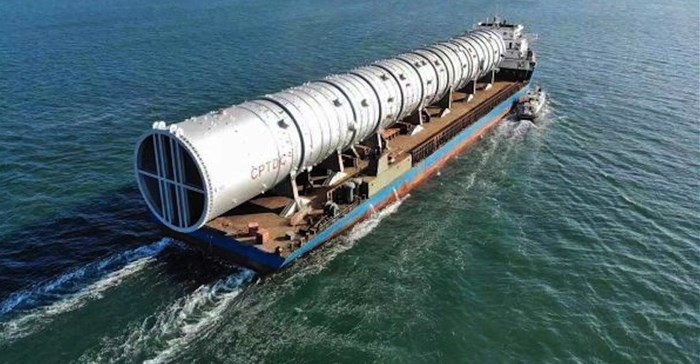
Subscribe & Follow
Advertise your job vacancies
Jobs and revenue: The potential of downstream development in Africa
Africa is one of the few regions where demand for oil and oil products is expected to grow significantly over the next two decades. In recent years, its downstream sector has seen investments of over $30bn. This has driven the development of logistics, distribution, storage terminals and retail marketing in the sector, said the African Refiners and Distributors Association (ASA) earlier this year.

The atmospheric tower destined to the Dangote Refinery in Nigeria. Image: The Gaurdian, Nigeria
Some of Africa’s biggest oil producers, including Nigeria, Angola, Algeria, Egypt and Libya, are now making significant progress in developing their mid- and downstream sectors, potentially allowing Africa to generate greater returns on its resources.
Revenue and job generator
In Nigeria, the Dangote Refinery, coming on-stream as a result of a $12bn private investment by the Dangote Group, is a prime example of the role private investment stands to play in advancing the African energy sector. The refinery's atmospheric tower – the largest in the world – has set sail for Lagos, Nigeria from Ningbo, China, taking the project a step closer to its 2020 launch date. The refinery will have the capacity for an estimated 650,000 barrels per day of crude oil and is expected to generate 9,500 direct and 25,000 indirect jobs.
“We don't need foreign investors to turn around our downstream sector. African investors should be able to emulate Dangote and revive the African downstream petroleum industry.” said the group’s Executive Director of Strategy, Capital Projects and Portfolio Development, Devakumar Edwin.
Upcoming mega-projects
While Dangote may be able to handle a project of such scale, in other African locations, international investment will be necessary to transform economies. Investment in critical infrastructure is moving ahead with a variety of local and international sponsors.
Saudi Aramco plans to build an oil refinery and petrochemical complex in South Africa and the China National Offshore Oil Corporation revealed it plans to take a stake in the $3.5bn East African crude oil pipeline. Much intra-African investment is taking place or originating in South Africa, with the state-owned Strategic Fuel Fund putting out a tender to begin planning of an oil refinery in South Sudan and state-owned logistics firm Transnet recently signing a cost-sharing agreement with the International Finance Corporation for an LNG storage and regasification terminal.
Energy and economic analyst, Samuel Johnson said in an article: “Whatever the myth around the petroleum refining industry which made other investors see importation of the products as a better investment sense than going into local refining, Dangote has now proved them wrong and removed the veil by venturing into it.”
In its African Refining Value Study, Wood Mackenzie concluded that “Even weaker refineries can provide a positive contribution to local economies.”
More capacity, even more jobs
The unemployment rate is at 27.6% in South Africa, 23.10% in Nigeria, and 18.8% in Angola. Africa overall has a youth unemployment rate of more than 60%.
Oil and gas in general and the mid- and downstream sectors in particular could stimulate massive economic and job growth. A 2015 study by PwC showed that the US recorded over 10.3-million jobs created by the oil and gas industry – accounting for 5.6% of the nation’s employment. A UK study by Oxford Economics concludes that the downstream sector (including retail) has a multiplier of 2.5 – every 1 GBP contributed directly by downstream oil and gas is augmented by 1.5 GBP elsewhere in the economy. For each downstream job, 1.4 jobs are supported in other sectors.
The power sector has also been pivotal in creating jobs and driving investment. In particular the decentralised renewable energy sector has accounted for 10,000 direct jobs in Kenya and 4,000 in Nigeria, revealed the Powering Jobs Census 2019: The Energy Access Workforce. Furthermore, “Access to electricity means access to jobs,” said Dr Rebekah Shirley, Power for All’s chief research officer and census lead researcher.
The census “offers strong evidence of the important link between energy access and employment in countries where rural joblessness is at record highs. Policy-makers, donors and the private sector have an opportunity to increase support for decentralised renewables and build a diverse, inclusive, and equitable workforce for the energy infrastructure of the future,” said Shirley.
Across the energy sector, from crude oil refining to power distribution, African economies for so long reduced to resource extraction are courting investment and moving ahead with energy infrastructure projects. With international and intra-African investment, the value of Africa’s 126 billion barrels of proven oil reserves can be multiplied many times over.
Related
OR Tambo fuel problem is a symptom of jet fuel crisis 10 Dec 2024 New SA National Petroleum Company gets Compcom nod 20 Sep 2024 Dangote refinery starts production, eyes full quota by year end 15 Jan 2024 African Energy Chamber is an outspoken advocate for African oil and gas 10 Dec 2023 R1.5bn plant nears completion at Richards Bay IDZ 17 Nov 2023





